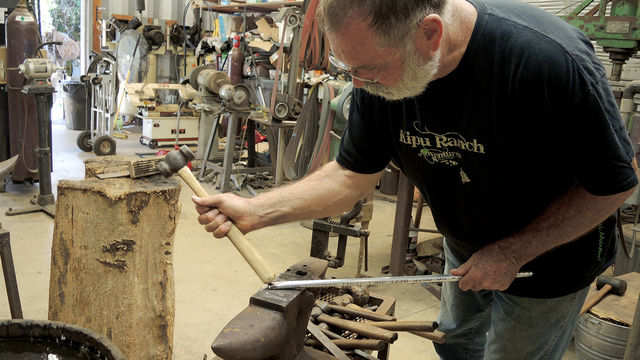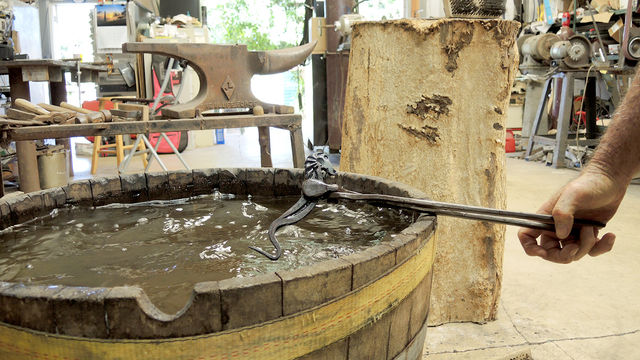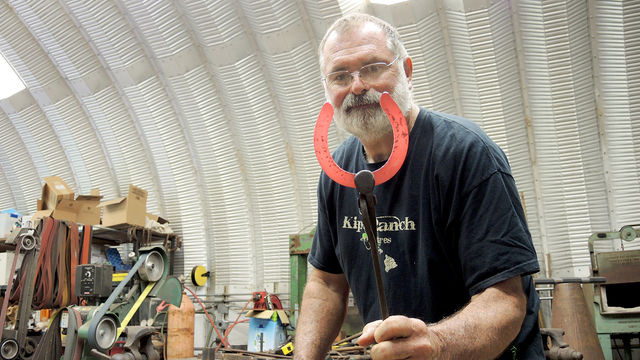Cowboy poet, farrier and blacksmith, Ted Shanks loves metal almost as much as he loves the Bible. He’s the owner of Kipu Forge, a blacksmithing company that provides a wide range of metal-work for craftsman, galleries, architects and homeowners. He’s
Cowboy poet, farrier and blacksmith, Ted Shanks loves metal almost as much as he loves the Bible.
He’s the owner of Kipu Forge, a blacksmithing company that provides a wide range of metal-work for craftsman, galleries, architects and homeowners. He’s been pounding metal for almost 40 years.
He makes indoor and outdoor railings, bedframes, gates, and once in a while, he shoes a horse. He makes his own blacksmithing and farrier tools and, while he can and does use some snazzy new technology, Shanks prefers to use old school methods.
How did you become a blacksmith?
I grew up with my grandmother in Tennessee. On my place there’s an old log cabin and that log cabin is where my father and grandfather lived and about 300 yards away is a chimney is where my great-grandfather was born. There’s six generations worth of history on that place.
I graduated high school and joined the Army, and while I was in the service, a blacksmith moved from New York to Tennessee. His name was Ellison Torbert and he was trying to get away. In reality it was a start of his fall out of society. At that time didn’t know this, but he was from a wealthy family and he was an extremely talented smith. He was a metal sculptor and he learned classically in Italy. He had gone to a couple prestigious Ivy League colleges.
My dad let him live in the cabin in my farm and when I got back there he’d built a blacksmith shop and he was making these incredible pieces of art that were selling in France. That’s unheard of that they would import from America. And his artwork was almost always in different types of metal, whether it be nickel or bronze. He’d make these sculptures that were relatively small and they’d be mounted on these motors that would turn them as slow as one time in an hour and they would go from masculine to feminine and it was incredible art. He was massively intelligent.
Ellison had this shop in town; nobody there knew who he was until he died. They were bringing in crap, never once something that would be his thing. It was always “Could you straighten my car wheel,” but he did some art once in a while though, and that’s where I learned.
He taught me with love and care and he held my hand and showed me how to do stuff. I was doing sculpting, but I don’t remember any of it now, what I really learned was technique.
Tell us about your shop, what kinds of tools do you use?
I make most of my own tools and they’re not much different than what they used to use. I have these big, modern, motorized machines but if you don’t know the basics of how to work with the metal, they’re really dangerous.
If you don’t know how to hold the metal when you’re pounding it with a regular hammer, it’s going to be a lot more dangerous if you’re using a power hammer.
I keep a big number of different tools so that I don’t waste time and always have the tool I need to get the job done. I do some big jobs, so I can’t waste time. I have a bunch of anvils, for instance, and each of them is shaped a little bit differently for each job.
What kinds of things do you make?
We make our own farrier tools, so we sell those and I make them for myself to use, too. I also do wrought-iron gates and railings, and I make horseshoes, too.
I’m in an area (on Kauai) where metal isn’t really the most desired thing because of the humidity. It rusts. But, I work with aluminum, which doesn’t rust, so that makes my stuff more marketable in Hawaii. A lot of people don’t work with aluminum because it’s really hard to forge, but I do.
Sometimes I shoe horses, too. Like I was just over on Maui shoeing Oprah’s horses.
And I hear you offer apprenticeships?
Apprenticeships with me last for five years and I think I’m done doing them. I like to build into people’s lives, though. I always like my apprentices to have a stake. For instance, on your first day we’d make something and then a couple days later, you’ll make another one and I’ve seen grown men cry because the second one they made is awesome compared to the first one.
I’m all about having celebrations of your successes.
I also like to tell my students not to be ignorant. That translates into life in general, too. They always get mad when I say it, but really think about the word: ignorant. It means to ignore something. That means you know the right way to do it, but you’re willfully not doing that.
When my apprentices keep making the same mistakes, I tell them to stop being ignorant. Think about what you’re doing and make the right corrections so you can do it right.
Another thing I tell them is always to watch your work. If you’re creasing a horseshoe, and you’re making that groove that you see in the horseshoe, you’re watching your work. If you’re just pounding that thing, it’s not going to be straight.
Learning how to be a blacksmith the way I teach it, it’s not just about learning how to be a blacksmith. I tell my apprentices that they can make something of themselves. It all starts with blacksmithing and learning the techniques, putting sweat and hard work into something, and then it goes into every other area of your life.
What else do you like to do?
My favorite thing in the world is the Bible. I like to read it and discuss it above everything else. I’m also a cowboy poet and I go to conventions and do cowboy poetry and blacksmithing demonstrations sometimes. I also play guitar and I love music. I write some of my own stuff, but my favorite thing in the world is the Bible.




